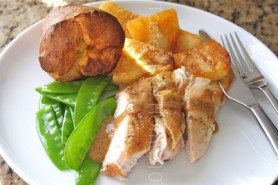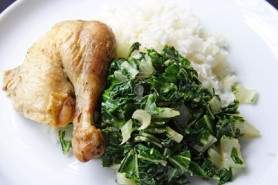Hi Everyone,
Torture. That was how the author who penned a column in Culture Box (Stabroek News, The Scene) a couple of years ago described her feelings as she set about planning her family’s daily menu. The columnist went on to say how envious some women would be, because of how effortless I make it all seem… and that they wished I could take over their kitchens, at least for a week. While I’m flattered, I think they may be surprised to learn that I too share their torture, pain and frustration. And let me tell you, it gets worse when you have to cook for one. Many of you may be shocked to know that I only cook twice a week. And on the rare occasion, three times.
 Cooking every day, no matter how much one enjoys the creativity, is no easy task. Given that each week I write about food, whether or not I want to, I have to cook and to experiment in order to provide fodder for my columns. Over the years I have been constantly adjusting the way I cook. When I started the column I would cook my regular “home” food and then cook “column” food. Two major things happened – I saw my food budget skyrocket and the joy I got from cooking began to wane. I had to make adjustments. I had to figure out a way to balance the time I spent in the kitchen and the time I had for the other aspects of my life, like my job and other interests. Long story short, I had to make some changes.
Cooking every day, no matter how much one enjoys the creativity, is no easy task. Given that each week I write about food, whether or not I want to, I have to cook and to experiment in order to provide fodder for my columns. Over the years I have been constantly adjusting the way I cook. When I started the column I would cook my regular “home” food and then cook “column” food. Two major things happened – I saw my food budget skyrocket and the joy I got from cooking began to wane. I had to make adjustments. I had to figure out a way to balance the time I spent in the kitchen and the time I had for the other aspects of my life, like my job and other interests. Long story short, I had to make some changes.
First came the mental adjustment.
We come from a culture where traditionally three fresh meals were prepared every day. Eating brought-forward, leftover, or day-old food was something that we were not accustomed to. But these days, with everyone in the household working outside the home, there’s no one there to take care of all the house chores and prepare hot meals to greet us when we come home.
The adjustment took some getting used to but eventually things just seemed to fall into place. My cooking plan has been working really well for me and I hope that it will for my friend at the Culture Box and for you too. I’ve gone from cooking 6 times a week to only cooking 2 or 3 times per week. The plan is not rigid, use it as a guide. Think of it as a starting point for your meals for at least 3 – 4 days of the week, which leaves the other 4 – 3 days for spontaneity.
Here’s what I do, on the weekends, usually Sundays, I prepare some sort of meat – chicken, pork, beef or lamb – enough that will last for 4 days. Generally, I would bake or roast the meat with an all-purpose seasoning mix so that when I use the meat during the week with different vegetables and/or starches (rice, potato, pasta, bread), there would be no clashing of flavours. Let me show you.

Last Sunday, I roasted a large chicken. In addition to roasting the chicken that day, I also roasted potatoes and steamed some snow peas. For my Sunday meal then, I had roast chicken, roast potatoes and steamed snow peas.
The following day, I cooked some plain rice (enough for 2 days). I stir-fried some pak choy and ate it with the rice and the roast chicken.
On Tuesday, I used the remaining rice to make vegetable fried rice with the steamed snow peas that remained from Sunday. Again I had some of the roast chicken, with my fried rice.
Notice how I cooked rice one way but used it in two different preparations?
On Wednesday, I decided to make a chicken salad with the remainder of the roast chicken; I even had enough salad remaining to make a chicken salad sandwich on Thursday! So, that roast chicken I made on Sunday, lasted me for 5 days; 5 different meals with 5 flavour profiles. The other 2 days are for spontaneity.
The other thing about this plan is that you have to be prepared to shake up the routine – switch around the meals, make some weekend kind of dishes during the week and vice versa. See? I made fried rice and chicken salad during the week and I still have weekday food when I cooked the pak choy. On the weekend my roast chicken and roast potatoes were very much weekend food.
For those of you cooking for families, you have to insist that they come up with ideas or offer suggestions. Whenever my mom visits me and I would ask her what to cook or what she would like to eat, her standard answer is, “Anything.” Anything?! What the heck is anything?! I don’t know why this response gets me so mad. In my mind I am thinking about the million other things I have to get done and all I am asking is for you is to merely suggest what you would like to eat. For heaven’s sake it’s not like you would have to go grocery shopping, do any of the prep work or even have to cook it, I’ll do all that, just tell me what you would like to eat. Help me!

On her last trip I could not keep it in any longer, I expressed how frustrated I get with her “anything” response and I explained that my asking is a plea for help and a desire to ensure she has a good visit. Mom said she understood and has promised to be more forthcoming with meal suggestions.
I know that I make it seem effortless and perhaps that is so because it is something that I enjoy doing. The truth is, cooking does take time, it takes planning, and it unreservedly begs for creativity, and yes, it is work. My suggested adjustment may work for you or it may not. You won’t know until you try. Perhaps it’s time you have a heart to heart with your loved ones – lay it all out on the table (pardon the obvious expression) – tell them about your cooking dilemma; ask them to share ideas; shake up your weekday/weekend cooking routine; buy an unfamiliar ingredient and experiment or think of new ways to prepare and present familiar ingredients.
Cynthia
[email protected]
www.tasteslikehome.org
Roast Chicken
Ingredients
1 4lb whole chicken
Salt and pepper to taste
1 bunch fresh thyme
1 large lime cut in half
1 tablespoon grainy mustard (substitute with regular)
Equipment
Kitchen string
1 roasting pan fitted with rack; line baking sheet with foil for easy clean up
Paper towels
1 frying pan
1 whisk
Directions
1. Preheat oven to 400 degrees F
2. Wash and pat chicken dry – inside and out
3. Using your fingers, gently separate the skin (breast and sides) from the flesh. Be careful not to tear the skin, you just want to be able to easily lift the skin from the meat
4. Season the chicken with salt and pepper to taste (inside and out and under the skin as well)
5. Push the bunch of thyme into the cavity of the chicken along with the cut lime (this is to impart some flavour and also to prevent the breast from drying out while roasting)
6. Tie the legs together to close the cavity
7. Transfer chicken to pan with rack; tuck in the wing tips towards the back of the chicken (to prevent the tips from burning)
8. Bake in preheated oven for 1 hour then reduce heat to 350 degrees and cook for another hour or until the juices run clear when a knife is inserted between the thigh and breast
9. Remove chicken from oven, transfer to a platter, over with foil to keep warm and let rest for 20 minutes before carving (resting enable the juices in the meat to be redistributed evenly)
10. Meanwhile, pour off the drippings from the roasting pan into a frying pan; add a tablespoon of grainy mustard and whisk together over low heat until fully incorporated
Carve chicken and serve with gravy and prepared side dishes
Note
The chicken can be seasoned with any spice mix or all-purpose seasoning. You can also opt for an herb paste to season your chicken.







